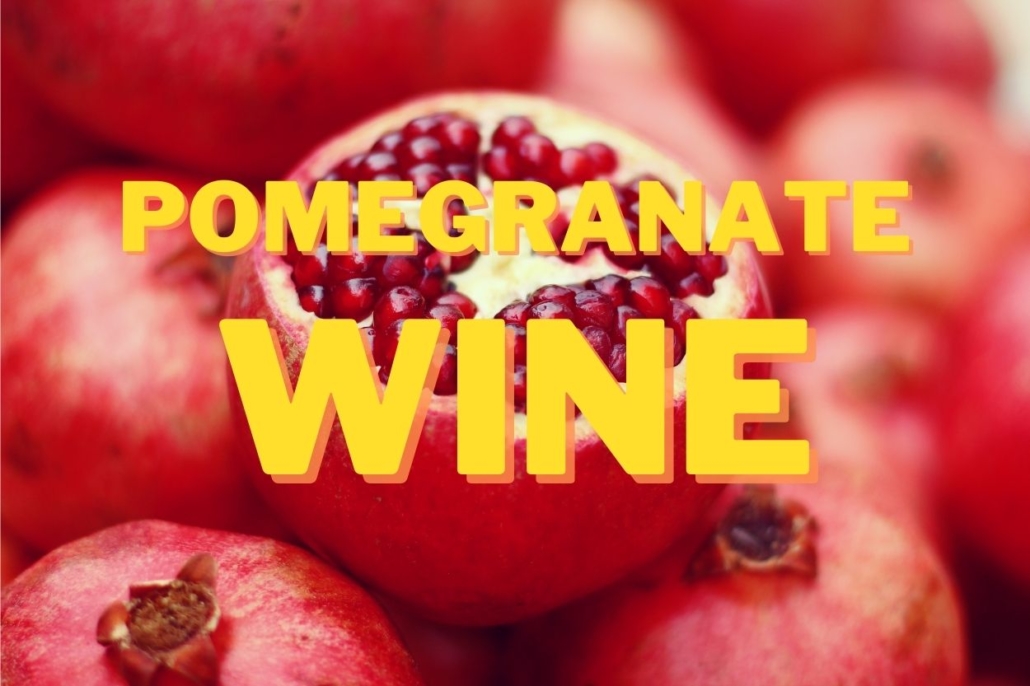Pomegranate Wine Recipe – Bright, Crisp Red Wine

Pomegranate is a peculiar fruit and when I was thinking about making a pomegranate wine all I could think about was all those seeds. Fear not, this recipe is really simple to make and results in a great wine that is tannic and refreshing at the same time.
The part of the pomegranate you eat is the seed and arils. Arils are the red, jewel-like covering of the seed and in a pomegranate, these are tart, sweet and bursts of flavour.
To try and capture this in a wine is a little tricky but it works really well. Pomegranate might not seem like a great choice for wine considering the cost and the fact that pomegranate is mostly pith and seeds. The flavour, however, of pomegranates translates well into a Beaujolais type wine.
Table of Contents
Preparing Pomegranates For Making Wine
Many people choose to forgo the use of preparing whole pomegranates and choose instead to use pre-prepared pomegranate juice. This makes good wine still but you do miss something I feel by not having the wine in contact with the arils and seeds which provide a certain amount of tannin and structure.
The way to prepare your pomegranates is to remove the arils which are the seeds and the surrounding membrane and juice. The pithy yellowish parts inside the pomegranate can be discarded.
To remove the seeds from the pomegranate, grab a bowl, cut the pomegranate in half crosswise, hit the top of each half whilst holding it over the bowl and the seeds will all come tumbling out along with juice and pulp. Remove any white pith that falls out and you are good to go.
Boosting Flavour & Body Of Pomegranate Wine
Pomegranate is a beautiful colour and has a wonderful flavour but there is not enough sweetness and body in the finished wine if you use pomegranates alone. Some winemakers use raisins to boost the body and this works quite well but I like to use grape concentrate.
Grape concentrate is just like grape juice but it is much higher in sugar and will add flavour and body. You won’t need a lot, around 250ml per gallon is enough and it can be picked up at nearly all home brew shops or online.
Grape concentrate comes as either white grape concentrate or red grape concentrate. I like the white one for pomegranate wine as it doesn’t overpower the flavour of the fruit and preserves that colour you get from the pomegranate.
What You’ll Need To Make Pomegranate Wine – Makes 1 gallon / 4.5 litres
- Large Stock Pot
- Small Fermenting Bucket
- Demijohn
- Syphon
- Fine Straining Bag
- Potato Masher
- Airlock & Bung
Pomegranate Wine Ingredients
- 6 Pomegranates
- 4.5 litres Water
- 250ml White Grape Concentrate
- 800g Sugar
- 1 tsp Acid Blend
- 1/4 tsp Wine Tannin
- 1 tsp Pectic Enzyme
- 1 tsp Yeast Nutrient
- 1 Campden Tablet
- 1 Sachet Wine Yeast (see this guide on wine yeasts for a selection)
Method
Prepare the pomegranate by slicing in half and hitting the back to knock out the arils and juice into a bowl. See this guide for help preparing the pomegranate.
Take half the quantity of water and combine in a large heavy-based pan with all the sugar. Bring to a boil, stirring to dissolve the sugar and simmer for a few minutes before removing from the heat.
In the sanitised fermenting vessel, add the straining bag and tip in all the pomegranate arils and juice. Use a potato masher to press the pomegranate and secure the straining bag.
Add the hot sugar syrup to the fermenter and give everything a stir and then add the remaining water to cool everything down. Leave for a few hours to cool.
Add the Campden tablet, wine tannin, acid and yeast nutrient and then stir to combine with a sanitised spoon. Cover the fermenter and leave overnight. Take a hydrometer reading at this point if you wish to know the exact specific gravity.
The following day add the pectic enzyme and mix then finally sprinkle the yeast over the surface of the must. Cover the fermenter and attach the airlock to the lid and then allow fermentation to start.
Allow to ferment for around 5 – 7 days stirring the straining bag daily to aid extraction. After 5 days remove the straining bag and squeeze gently and the pulp can be discarded. Leave to settle for a day and then rack to a sanitised demijohn and add an airlock.
Allow to ferment in the demijohn. After a few weeks, the wine will have finished fermentation and begin to clear. Sediment will begin to build up and once this happens rack to a clean demijohn. Take a hydrometer reading when racking to get the final gravity.
Leave the pomegranate wine in the demijohn for at least 2 months or until completely cleared before bottling. If you prefer a sweeter wine then look at this guide on back sweetening. The wine can be stabilised and sugar added before bottling. Once bottled the wine will continue to improve with age and will peak after around a year.




Leave a Reply
Want to join the discussion?Feel free to contribute!